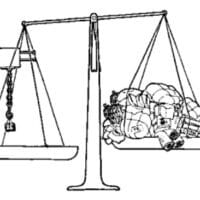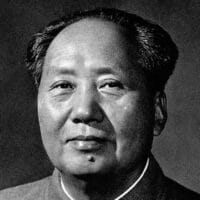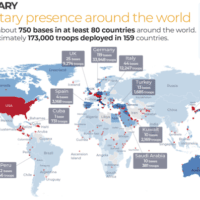-
The Migrant Genocide: Toward a Third World Analysis of European Class Struggle
Over 10,000 people died in transit to Spain in 2024 alone.[1] On June 2022, the border fence of Melilla, one of two Spanish enclaves in Morocco, was witness to a massacre that killed or disappeared over a hundred African migrants.[2] A recent BBC investigation revealed that Greek border guards systematically repeal immigrants already on Greek […]
-
US Imperialism in Crisis: Opportunities and Challenges to a Global Community with a Shared Future
1. Introduction The predominance of US economic, political and military power in the world was established at the end of the Second World War.1 With just 6.3 percent of global population, the United States held about 50 percent of the world wealth in 1948. As the only power which had used nuclear weapons on civilian […]
-
Seven Decades of China-Brazil Friendship: Cultural Diplomacy, Agrarian Reform, and the Cold War
This year, Brazil and China celebrate fifty years of official diplomatic relations. The importance of the Sino-Brazilian relationship cannot be underestimated in the context of the rise of the Global South, the decline of U.S. hegemony, and the emergence of a New Cold War. With a look back into the history of bilateral relations, how can we understand the importance of these two countries in the current conjuncture in pushing forward changes unseen in a century?
-
Neoliberalism and the Socialist Movement in Britain: From the Third Road to Jeremy Corbyn and Brexit
Zhao Dingqi interviews Dave Hill about neoliberalism and the socialist movement in Britain.
-
Whether Bird Flu Is on the March Misses the Point
The New England Journal of Medicine reported the case of a Texan farmworker infected with HPAI H5N1. He suffered the hemorrhaging in the eye the cows he tended expressed.
-
From Harvard to Karl-Marx-Allee: The Experiences and Reflections of an American Communist in East Germany
In this interview with Zhao Dingqi, Victor Grossman reflects on his life as an American communist in East Germany.
-
CFA Franc System in Francophone Africa: A tool of French financial imperialism
The independence of French Indochina after the Second World War triggered a wave of independence in the French-speaking African countries, and it appeared that French colonial foundations had suffered a huge blow in the early 1960s.
-
Ruy Mauro Marini’s Contribution to the Political Economy of Imperialism
In “The Dialectics of Dependency,” Ruy Mauro Marini developed a theory of dependency and unequal exchange that is still invaluable today.
-
The Unbearable Unawareness of Our Ecological Existential Crisis
Only an ecosocialist revolution can stop our demise, but capitalism’s behemoth keeps people deceitful and mostly unaware of being on the verge of a catastrophic end. We must arise—now!
-
Post-Political Post-Aesthetics
The universal premises of culture and politics have been subject to criticism from the moment that Enlightenment theories emerged. In postmodern theory, radical skepticism replaces judgement and makes universal speculation seem like either an absurd game or a violent imposition.
-
Gendered Violence as an Inextricable Thread of Capitalism
The gendered forms of violence in capitalist-patriarchal societies are, obviously, related to what is habitually recognized as violence against women.
-
Extractivism in the Anthropocene
Late Imperialism and the Expropriation of the Earth.
-
Why is the great project of Ecological Civilization specific to China?
When the concept of ecological civilization came to prominence in China, beginning around 2002 it was depicted as a defining element of socialism with Chinese characteristics, requiring a transition away from the expropriation of nature endemic to capitalist modernity and pointing to the need for worldwide social transformations. It was thus closely related from the start to the Marxist critique of capitalism.
-
Imperialism is at war with our planet—and we need to stop it
While the rich embark on trips to space and fantasize about colonizing Mars, nearly a billion people have no access whatsoever to electricity.
-
U.S. imperialism: Reflections from a Ukrainian mirror
War is like a volcanic eruption in that it both exposes and obscures the clash of powerful forces.
-
A Unity of Opposites: The Dengist and the Red Guard
What would Losurdo and Badiou say about each other’s views on Mao? Losurdo would likely consider Badiou to be infected with Western Marxist abstractions and anarchism in his celebration of mass rebellion and disregard for the needs of realism. By contrast, Badiou would no doubt consider Losurdo to be a Stalinist cop, with his defense of order, normalcy, and the bureaucratic party-state.
-
From Commodity Fetishism to Teleological Positing: Lukács’s Concept of Labor and Its Relevance
The concept of labor constituted a pivotal problematic in Georg Lukács’s theoretical development throughout his Marxist years.
-
The Struggle between the Future and the Past: Where Is Cuba Going?
I have two favorite sayings. One draws on the dialogue in Shakespeare’s Henry the VI part 2 when Jack Cade envisions that the effect of his plot will be that “all the realm shall be in common.” To this, comrade Dick responds, “the first thing we do, let’s kill all the lawyers.”
-
Mapping U.S. Imperialism
This article deals with U.S. imperialism since World War 2. It is critical to acknowledge that U.S. imperialism emanates both ideologically and materially from the crime of colonialism on this continent which has killed over 100 million indigenous people and approximately 150 million African people over the past 500 years.
-
The Obama Line, Samantha Power, and U.S. Intervention in West Africa During the Ebola Epidemic
December 2013 marked the beginning of the worst Ebola outbreak in history. Ebola, a severe hemorrhagic virus which causes muscle and joint pain, diarrhea, vomiting, and bleeding, spread from Guinean forests to the capitals of Liberia and Sierra Leone by the summer of 2014.


![A late 1940s Soviet poster showing a US military service member lounging on top of a German factory, smoking a cigar. The text beneath reads DER DOLLARIMPERIALISMUS [dollar imperialism].](https://mronline.org/wp-content/uploads/2025/04/Confuse_and_Control_Department_of_State_Publication_4107_1951_-_Soviet_propaganda_line_-_Dollar_imperialism_the_enemy_of_the_German_people-e1744342177232-200x200.png)

















